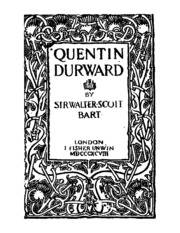Table Of ContentTHE.CENTURY
& SCOTT 2
QUENTIN
PETS
WARE
®
v
FOTN DURWARD
. CHAP. I.
Look here upon this picture, avd on this,
The counterfert presentment of two brothers,
Hamurt,
HE latter part of the fifteenth century prepared
fa train of future events, that ended by raising
France to that state of formidable power, which
has ever since been, from time to time, the principal
object of jealousy to the other European nations. Before
that period, she bad to struggle for her very existence
with the English, already possessed of her fairest pro-
vinces ; while the utmost exertions of her King, and the
gallantry of her people, could scarcely protect the re-
gree from a foreign yoke. Nor was this ber sole
nger. The princes who possessed the grand ficfs ot
the crown, and, in particular, the Dukes of Burgundy
and Bretagne, had come to wear their feudal bonds so
lightly, that they had no scruple in lifting the standard
against their fiege and sovercign ford, the King of
France, on the slightest pretence. When at peace, they
reigned as absolute princes in their own provinces ; and
the House of Burgundy, possessed of the district so
called, together with .the fairest and richest part of
Flanders, was itsel€ sovwealthy, and so powerful, as to
yield nothing to the crdita, either in splendour or in
‘strength.
z Donathl hy B
Br ss. Oo. MANDY, MLA.
Mehoragkumar of Coasimbasar.
same
QUENTIN DURWARD.
In imitation of the grand feudatoriey, each inferior
vassal of the crown assumed as much i/dependgice as
his distance from the sovereign power, the extent “is
fief, or the strength of his chateau, enabled ifm to
maintain ; and these petty tyrants, no longer amenable
to the exercise of the law, perpetrated with impunity the
wildest excesses of fantastic oppression and cruelty, In
Auvergne alone, a report was made of more than three
hundred of these independent nablet#to whom incest,
murder, and rapine, were the most ordinary and familiar
actions.
Hesides these evils, another, springing out of the
long-continued wars betwixt the French and English,
added no small misery to this distracted kingdom.
Numerous bodies of soldiers, collected into bands,
under officers chosen by themselves, from among the
‘bravest and most successful adventurers, had heen formed
in various parts of France out of the refuse of all other
countries. These hireling combatants sold their swords
for a time to the best bidder; and, when such service
was not to be had, they made war on their own account,
seizing castles and towers, which they used as the places
of their retreat,—making prisoners, and ransoming them,
—exacting tribute from the open villages, and the county
around thent,—and acquiring, by every species of rapit ~
the appropriate epithets of Tondeurt and Ecorckeurs,
that is, Clippers and Flayers.
Jn the midst of the horrors and miseries arising from
s0 distracted @ state of public affairs, reckless and pro-
fuse expense distinguished the courts of the lesser nobles,
as well as of the superior princes ; and their dependants,
in imitation, expended in rude, but magnificent display,
the wealth which they extorted from the people. A tone
of romantic and chivalrous gayfantry (which, however,
was often disgraced by unboaded license) characterised
the intercourse between th sexes; and the language of
a
QUENTIN DURWARD,
indifferent who knows that Lam a cadet of Scotland ; and
that [come to seck my fortune in France or elsewhere,
after he cust6m of my countrymen."
« Pasques-diee / aad 2 gallant custom it is,” said the
elder stranger. ‘ You seema fine young springald, and
at the right age to prosper, whether among men or
women. What say you? Lam a merchant, and want a
lad to assist in my traffic—I suppose you are too much a
gentleman to assist in such mechanical drudgery?”
“Fair sir,” said the youth, ‘if your offer be seriously
made—of which 1 have my doubts—I am buund to thank
you for it, and I thank you accordingly ; but I fear
should be altogether unfit for your service.
** What!" said the senior, “I warrant thou knowest
hetter how to draw the bow, than how to draw a bill of
charges,—canst handle a broadsword better than a pen
—ha
“Lam, master,” answered the young Scot, “a brae-
man, and therefore, as we say, a bowman. But besides
that, Fhave been in a convent, where the good fathers
taught me to read and write, and even to cipher.
“" Pasgues-diex} (hat is tao magnificent," said the
merchant. “By our Lady of Embrun, thon art a
prodigy, man!"
“Rest you merry, fair master," said the youth, who
vas not mucl, pleased with his new acquaintance’s jocu-
larity; ‘I must go dry myself, instead of standing
dripping here, answering questions.”
‘The merchant only laughed louder as he spoke, and
answered, “' Pasgues-diex/ the proverb never fails—frr
comme tn Ecossois-—but come, youngster, you are of a
country I have a regard for, having traded in Scotland in
my time—an honest poor set of folks they are; and, 1f
you will come with us to the village, Iwill bestow on you
acup of burnt sack and a warm breakfast, to atone for
Agr drenching, — But, téte-diew/ what do you with a
”7

